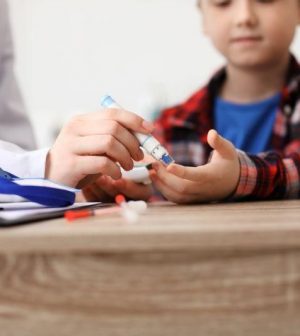- Could Your Grocery Store Meat Be Causing Recurring UTIs?
- Are You Making This Expensive Thermostat Error This Winter?
- Recognizing the Signs of Hypothyroidism
- 10 Strategies to Overcome Insomnia
- Could Artificial Sweeteners Be Aging the Brain Faster?
- Techniques for Soothing Your Nervous System
- Does the Water in Your House Smell Funny? Here’s Why
- Can a Daily Dose of Apple Cider Vinegar Actually Aid Weight Loss?
- 6 Health Beverages That Can Actually Spike Your Blood Sugar
- Treatment Options for Social Anxiety Disorder
FDA Approves New Drugs to Treat Type 2 Diabetes in Kids

The U.S. Food and Drug Administration on Tuesday approved two drugs that have been used in adults with type 2 diabetes for years for use in children aged 10 and up.
The approvals of Jardiance (empagliflozin) and Synjardy (empagliflozin and metformin hydrochloride) provide a new class of medications for pediatric type 2 diabetes. They join metformin, which has been approved for children with type 2 diabetes since 2000.
“Compared to adults, children with type 2 diabetes have limited treatment options, even though the disease and symptom onset generally progress more rapidly in children,” Dr. Michelle Carey, associate director for therapeutic review for the division of diabetes, lipid disorders and obesity in the FDA’s Center for Drug Evaluation and Research, said in an agency news release. “Today’s approvals provide much-needed additional treatment options for children with type 2 diabetes.”
Type 2 diabetes is a chronic, progressive condition in which the body does not make or use insulin normally. Type 2 diabetes in children increased by 4.8% per year from 2002 to 2015, according to the SEARCH for Diabetes in Youth study. That number could reach 220,000 by 2060 if trends continue. The majority of cases are occurring in minority racial and ethnic groups.
Before the approval, the active ingredient in both medications was tested for safety and effectiveness in a double-blind, randomized trial that included 157 patients aged 10 to 17. Participants were randomly assigned to one of three treatment arms for 26 weeks. The trial found that, at week 26, treatment with empagliflozin, the active ingredient in these medications, was superior in reducing hemoglobin A1c (HbA1C), which is a measure of average blood sugar levels, compared to the placebo.
The 52 patients treated with empagliflozin had an average 0.2% decrease in HbA1C compared with an average 0.7% increase in HbA1C in the 53 patients taking a placebo.
Side effects included a higher risk of low blood sugar levels among pediatric patients compared to placebo, regardless of whether they were taking other therapies for diabetes.
The most common side effects in adults using the medication include urinary tract infections and female fungal infections. In patients treated with metformin, which Synjardy also contains, the most common side effects in patients included diarrhea, nausea and upset stomach.
These medications are not recommended for patients with type 1 diabetes, because of an increased risk of diabetic ketoacidosis, or for those with severe kidney problems.
More information
The U.S. Centers for Disease Control and Prevention has more on type 2 diabetes in kids.
SOURCE: U.S. Food and Drug Administration, news release, June 20, 2023
Source: HealthDay
Copyright © 2026 HealthDay. All rights reserved.










